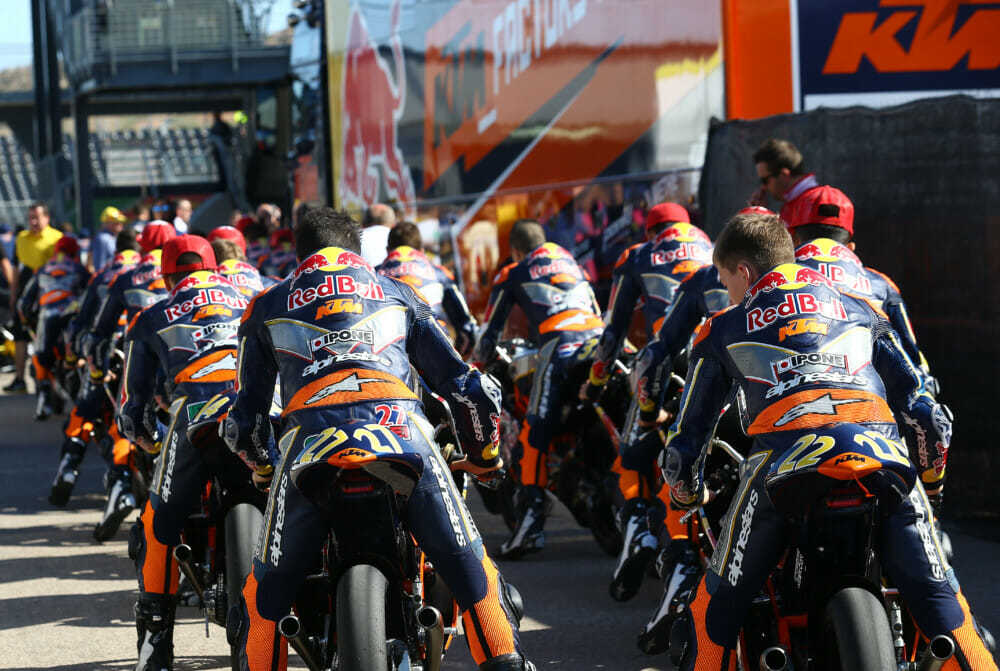Cycle News Lowside
COLUMN
So You Wanna Be A Racer?
I did. I still do. At 39 years old. That goes to show the intoxication of the sport, that it captivates people from five to 50 alike.
But motorcycle racing as a career is an incredibly perilous choice. Like the NBA, 99.999 percent of people who pick up a helmet with the idea of being the next Fabio Quartararo won’t make it. Most don’t even get close.
The reasons for not making it are so varied there’s no single defining factor. If you’re good enough to even consider making the sport your career, there are so many cards that need to fall your way. Talent is about 30 percent of the equation when it comes to being a pro racer. The rest is money, timing, and having the single-minded determination to make it happen, regardless of financial, physical or personal ruin.
What got me on this train of thought was an incredibly honest YouTube video made by now former British Championship racer, Taylor Mackenzie. If the name sounds familiar, it should. Taylor is the son of former 500cc rider and three-time BSB champion, Nial, and with the contacts his father has, you’d think it was a straight path to the top, right?
Taylor announced his retirement a few weeks ago at the age of 28 and compiled a career retrospect of what he calls ‘the snakes and ladders of racing.’
Anyone wishing to make racing their occupation should watch this video. Just click on the above link.
In it, Taylor explains how crap bikes, teams, injuries and the sheer stress of racing at a high level eventually sucks the fun out of racing. And the fact that at 25, he was still having to pay teams to do races was quite insane. As he says, “I don’t know any job where you go for an interview, your credentials are checked, and the boss asks you, ‘how much are you going to pay to do the job?’”
Very rarely in racing is something as it seems. Shady deals and favoritism between team boss and one teammate over another can undermine trust, and when there’s money involved, it can get real nasty. Many team owners out there are in it for financial gain (why would they not be?), one way or another, unless they happen to be business moguls and just enjoy racing, such as the Estensen crew in flat track.

Speaking from a road-racing point of view in America today, there are probably 10 riders in the entire MotoAmerica paddock who could genuinely call themselves full-time, professional motorcycle racers. That’s 10 in a population of 329.5 million in the United States. These riders, you can probably guess who they are, are paid by their team to do a job, just like I’m paid by Cycle News to write stories for you folks. The rest are not paid, so they’re not technically professionals. They are certainly elite-level athletes, but if they don’t make their living out of the sport, they are not professionals. Oxford Languages describes a “professional” as, “engaged in a specified activity as one’s main paid occupation rather than as a pastime.” It doesn’t matter what your Instagram bio says.
If being a professional racer in America is close to impossible, it’s even harder in Europe, where closed-door deals and relationships rule the roost as to who gets what and who goes where. The days of being contracted to a factory like Honda in America and the Japanese placing you in the Repsol Honda team like Nicky Hayden are long gone. That was the traditional way, just as it was for Kevin Schwantz and Suzuki. Now you have to really grind it out, like Joe Roberts has been doing, to get noticed.
The Europeans at least have some respect for the American riders who go to Europe off their own bat and make a go of it, but to do so you need money. Lots of it. And to get into the big time of MotoGP is about as easy as becoming a brain surgeon.
Motorcycle racing should be done because it’s fun, not because you want to make it a job. If it’s fun, you’ll go well, which then might get you a sponsor or two, which then may morph into a ride you don’t have to pay for, which then morphs into a ride you get paid to take. That’s the dream, but I’ve seen so many young families wreck themselves because junior was going to be the next world champion but couldn’t win a club race. That’s the cold fact about racing—the stopwatch never lies.
Motorcycle racing should be done because it’s fun, not because you want to make it a job.
The guys that do make it are once-in-a-generational talent. When Casey Stoner went to England, his family sold everything they had to make it happen. If he went to Donington Park and broke his back at 13 years old, the family would be in financial ruin they’d still be making up for. It takes a certain type of person, with god-like talent, to make damn sure they succeed in racing. Casey just happened to be one such person.
But hey, I’m not trying to discourage anyone from pursuing your dreams of becoming a professional motorcycle racer, but you need to know that you’ve got to be tough as nails to make it in racing. You need to be ruthless, to play your cards extremely well, and to make sure you don’t get screwed over by anyone, because there are people in the game who don’t have the best interests of a young rider at heart. Just like the quote in the TV show Yellowstone, “There’s sharks and minnows in this world, Jimmy, and if you don’t know which one you are, then you ain’t a f***in’ shark.” And in racing, sharks always rule the roost.CN
Click here to read the Lowside Column in the Cycle News Digital Edition Magazine.
Click here for all the latest motorcycle Industry News on Cycle News.
